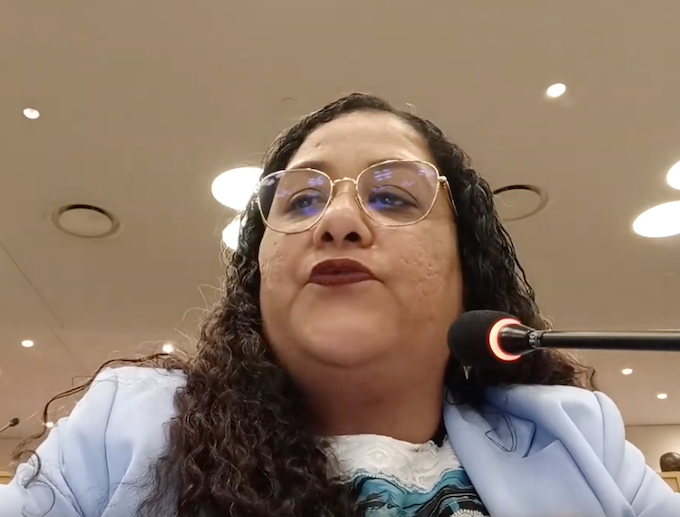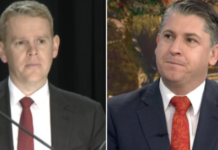
David Robie also blogs at Café Pacific
New Caledonia’s Kanak national liberation movement has told the UN Decolonisation Committee that France has “robbed” the indigenous people of their independence and has appealed for help.
Magalie Tingal-Lémé, the permanent representative of the Kanak and Socialist National Liberation Front (FLNKS) at the UN, told a session of the Committee of 24 (C24) — as the special decolonisation body is known — that the French authorities had failed to honour the 1998 Noumea Accord self-determination aspirations, especially by pressing ahead with the third independence referendum in December 2021 in defiance of Kanak opposition.
More than half the eligible voting population boycotted the third ballot after the previous two referendums in 2018 and 2020 recorded narrowing defeats for independence.
- READ MORE: Politician tells UN New Caledonia is not a colony
- Unfinished business over New Caledonian decolonisation – new challenges after ‘stolen’ referendum
- Independence for Kanaky: A media and political stalemate or a ‘three strikes’ Frexit challenge?
- Other Kanaky New Caledonia reports
The pro-independence Kanak groups wanted the referendum delayed due to the devastating impact that the covid-19 pandemic had had on the indigenous population.
Tingal-Lémé told the UN session that speaking as an indigenous Kanak woman, she represented the FLNKS and “every time we speak before your institution, we carry the voice of the colonised people”.
“When we speak of colonisation, we are necessarily speaking of the people who have suffered the damage, the stigma and the consequences,” she said in her passionate speech.
“On September 24, my country will have been under colonial rule for 170 years.”
Accords brought peace
Tingal-Lémé said two political accords with France had brought peace to New Caledonia after the turbulent 1980s, “the second of which — the Nouméa Accord — [was taking] the country on the way for full emancipation”.
“And it is in a spirit of dialogue and consensus that the indépendentistes have kept their word, despite, and in the name, of spilled blood.”
Magalie Tingal-Lémé’s speech to the UN Decolonisation Committee. Video: MTL
In 2018, the first of three scheduled votes on sovereignty, 56.4 percent rejected independence with an 81 percent turnout of the 174,995 voters eligible to vote.
Two years later, independence was again rejected, but this time with an increased support to almost 47 percent. Turnout also slightly grew to 85.69 percent.
However, in December 2021 the turnout dropped by about half with most Kanaks boycotting the referendum due to the pandemic. Unsurprisingly, this time the “yes” vote dropped to a mere 3.5 percent.
“Since December 12, 2021, when France maintained the third and final referendum — even though we had requested its postponement due to the human trauma of covid-19 — we have never ceased to contest its holding and its results,” Tingal-Lémé said.
Nearly 57 percent of voters had not turned out on the day due to the covid boycott.
‘We’ll never accept this outcome’
“We believe that through this illegitimate referendum, the French state has robbed us of our independence. We will never accept this outcome!
“And so, unable to contest the results under French internal law, we are turning to the international community for an impartial institution to indicate how to resume a process that complies with international rules on decolonisation.
“Through the Nouméa Accord, France has committed itself and the populations concerned to an original decolonisation process, which should lead to the full emancipation of Kanaky.
“Today, the FLNKS believes that the administering power has not fulfilled its obligations.”
Tingal-Lémé said the “latest evidence” of this failure was a New Caledonian decolonisation audit, whose report had just been made public.
She said this audit report had been requested by the FLNKS for the past five years so that it would be available — along with the assessment of the Nouméa Accord — before the three referendums to “enlighten voters”.
“The pro-independence movement found itself alone in raising public awareness of the positive stakes of self-determination, and had to campaign against a state that sided with the anti-independence groups.”
Entrusted to a ‘market’ firm
Also, the French government had “entrusted” this work to a firm specialising in market analysis strategies, she said.
“This shows how much consideration the administering power has given to this exercise and to its international obligations regarding the decolonisation.
“Frankly, who can believe in the objectivity of an audit commissioned by a government to which the leader of New Caledonia’s non-independence movement belongs?” Tingal-Lémé asked.
“It is already clear that, once again, France does not wish to achieve a decolonisation in the Pacific.
“This is why the FLNKS is petitioning the C24 to support our initiative to the United Nations, with the aim of getting an advisory opinion to the International Court of Justice.
“The objectives of this initiative is to request the ICJ to rule on our [indigenous] rights, those of the colonised people of New Caledonia, which we believe were violated on December 12, 2021.”
Advisory opinion
The FLNKS wanted the ICJ to make an advisory opinion on the way France “has conducted the decolonisation process, in particular by holding a referendum without the participation of the Kanak people.”
Tingal-Lémé pleaded: “We sincerely hope that you will heed our call.”
According to New Caledonia’s 2019 census, the indigenous Kanaks comprise a 41 percent share of the 271,000 multiethnic population. Europeans make up 24 percent, Wallisians and Futunans 8 percent, and a mix of Indonesians, ni-Vanuatu, Tahitians and Vietnamese are among the rest.
First published on Asia Pacific Report.




It’s well past time for Hawai’i and Kanaky to be completely cleansed of alien occupation.
Mohammed Khan: “It’s well past time for Hawai’i and Kanaky to be completely cleansed of alien occupation.”
What do you mean by this? Do you think that all people who aren’t indigenous, or of indigenous descent, should just be tipped out of those countries? You may be too young to be aware that this has happened before, and in the 20th century: Idi Amin did it to the Indians (descendants of indentured labourers) in Uganda. It would be no less violent and unjust, were a similar thing to happen now.
Hawai’i, for instance, is a US state. While its incorporation into the US was shameful, nobody can undo the past, without causing further egregious injustices.
The same applies to New Caledonia. For better or for worse, it remains a colony of France. The last referendum made that point emphatically. The best it could hope for is independence, as we have in NZ. But decolonisation? It’s a pipe dream. As it would be here, incidentally.
Thanks D’Esterre we need to be reminded that the ‘cleansing’ approach leaves dirty traces. Human nature is not something that can be treated mechanically but we need to learn this fast or the MKs will possibly use their AK47s and their AIs and drones to dehumanise the world in search of some perfect state.
Yanks and yank-lovers out of everywhere.
“Yanks and yank-lovers out of everywhere.”
Nonsense.
Can we go to UN and plead contra proferentem about being weak and feeling pressured and bribed into signing up free trade agreements that are are so strongly stacked against us, all the rich people in the world against 5 million mixed citizens, on the basis of a power imbalance. (With extra-legislative rules and fines to keep us in line decided by business interests themselves)? Won’t anyone hear our plea?
The Kanaks are not stupid, they need only look at their impoverished cousins in Vanuatu (and elsewhere in the Pacific) to realise how much better off they are – infant mortality, life expectancy, education, housing are better in New Cal – and not just a little bit.
David George: agreed. Be careful what you wish for, as the old Jewish proverb says.
She said this audit report had been requested by the FLNKS for the past five years so that it would be available — along with the assessment of the Nouméa Accord — before the three referendums to “enlighten voters”.
“The pro-independence movement found itself alone in raising public awareness of the positive stakes of self-determination, and had to campaign against a state that sided with the anti-independence groups.”
Entrusted to a ‘market’ firm
Also, the French government had “entrusted” this work to a firm specialising in market analysis strategies, she said…
“Frankly, who can believe in the objectivity of an audit commissioned by a government to which the leader of New Caledonia’s non-independence movement belongs?” Tingal-Lémé asked.
“It is already clear that, once again, France does not wish to achieve a decolonisation in the Pacific.
This excerpt indicates how under the new politics and economics in the world, that succumbs to ‘efficiency’ and private management firms, citizens in any country may have their views disregarded: the management report likely will state that their assertions of their rights and wishes for their future status are specious, so there.
What is needed is dominant countries to step back and make fair payment for resources used, and even lessen demand down to the essential for basic needs of functioning economies. But this would lessen the incomes of large and small corpse. It may be that we have to suffer a Great Economic Depression; so we all need to set up ‘freedom groups’ thinking for their needs, learning basic skills ex-government for the good of the whole country which has respect for all. Survivalists are often self-centred and want to wipe all systems, but groups who want to preserve their society and community with respect for all may succeed with commitment and loyalty to the ideal, good skills and reasonable controls, and inter-connection between those groups who co-operate.
These are hard times, so it is important to press the UN and remind them that they aren’t just a pool of highly-educated brains that have talk-fests, but that there is moral strength manufactured there. But climate change may mean it is too late for the planned independence the New Caledonians Kanaks seek. But having their independent, self-sufficient skills in practice as much as possible with a clear plan to follow a breakdown of suzerainty may be the route for their self-preservation.
COVID has a lot to answer for. The NZ Cannabis Referendum would likely have passed if not for COVID when momentum of YES was halted. The concrete conditions of the New Caledonia Referenda need to be better known, but it sounds like tyranny of the majority over Kanaks.
I feel for Kanaks, indigenous people are always relegated and the colonisers–and new arrivals–let off the hook and continue to exploit.
The French have massive cheek anyway, they should hang their heads and go, it was not that long ago they were blasting Pacific atolls with nukes!
Tiger Mountain: “The concrete conditions of the New Caledonia Referenda need to be better known, but it sounds like tyranny of the majority over Kanaks.”
I remember reading about this. The article makes clear that Kanaks boycotted the last referendum. I think that’s called “shooting oneself in the constitutional foot”. The rest of the population which did turn out to vote, rejected independence. Though even all eligible Kanaks had voted, they don’t have the numbers by themselves to bring about a vote in favour. Unless they’d been able to persuade a significant proportion of the rest of the population to vote with them, And, as we see from the result, the rest of the population didn’t favour independence.
I do not know what Kanak people want from the UN: France will ignore any declarations. The people who voted have spoken.